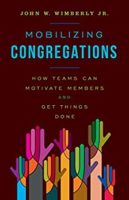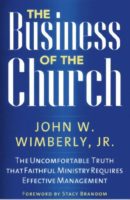
Many congregations and judicatories make do today with smaller staffs than they had ten years ago. How are they doing? Where I’m working, I would say, “Not always well.” Members want the same or even more “services” in the past from a smaller staff. They say, “We can do more with less.”
I don’t know about you, but my experience with “Let’s do more with less” is not positive. This is the hard truth: When we have less, we generally do less. How can we do more with a smaller staff? Too few admit the obvious, painful reality: We can’t. But we can focus the resources we do have on meeting the most pressing needs we see around us now.
I study management trends in the business and non-profit worlds for insights into the way religious organizations should be managed. While some don’t like to view religious organizations as a business, legally, they are non-profit corporations or associations. Like every business, they have income and revenue, pay salaries, and have assets and liabilities. (Walks like a duck, quacks like a duck….) Congregations are businesses whether we want to admit it or not. They should be businesses directed by faith-based principles, faith-inspired purposes, and faith-designed practices.
Cutting Staff
A recent move by Macy’s, the struggling department store company, caught my eye. They announced a layoff of 2,000 employees in their corporate offices, representing 13% of their total workforce in those offices. The move matches what is happening throughout the corporate and non-profit world. Layoffs are no longer focusing on lower-salaried positions in sales or customer service. Layoffs now are hitting higher-paid middle managers. What does this trend say to religious judicatories and congregations?
Reduction of middle-management staff has been taking place in the church for a while. Over the past three years Covid, reduced attendance and financial giving, and other factors have sped the process up. Higher-paid program staff positions are an easy target. The shortage of clergy in most mainline denominations is also making it difficult for congregations to fill full-time “middle management” positions for associate pastors, youth pastors, and educators.
Pick What Is Most Important
To keep our ministries important and relevant with fewer staff, we need to prioritize and protect what is most important in ministry in 2024. We then prune everything else down to a doable amount of work given the resources available (people, money, buildings). If we don’t prioritize and prune, we will burn out our remaining staff and volunteers.
As we plan, we need to engage as many people as possible in the process. To the extent possible, the entire congregation needs to understand the realities of doing less with less. When people say, “I don’t want to cut that,” we need to respond, “OK, fine. Then what do you want to cut because we don’t have the staff, volunteers, or finances to do everything we’ve done in the past.”
As we prune, we also need to reject the suggestion that volunteers automatically pick up the slack. The reason many staff were hired is because it is challenging to find volunteers these days. There are lots of reasons to explain the decline in volunteerism in the church, e.g. two-career families, aging demographics, competing opportunities to volunteer outside the church, etc. Relying on volunteers to carry out the most labor-intensive aspects of ministry, as in decades past, is no longer a sound strategy.
Tell the Truth
Good leaders tell people the truth. They lay out the facts—positive and negative. Too little of that is going on. Instead, we try to kid ourselves and others that we can “do more with less.” We need to treat our members like adults. Most of them accept reality when they plan for their family’s finances in responsible ways. They can do it. They can also do it in congregations and judicatories if we will help them face the facts of ministry in 2024.
The fact that we can’t “do more with less” doesn’t mean we cannot be effective and faithful. In the most energetic and dynamic periods in church history, the church was not led by paid staffers. I’ve worked recently with a lot of Methodists. They love to tell stories of Wesley-inspired small groups popping up and creating amazing congregations as they evolved. My grandfather’s generation of Presbyterian ministers didn’t rely on paid staff, but had far more mission and membership growth than did my generation of pastors in staff-driven congregations.
By discarding the “be all things to all people” style of ministry that dominated the last seventy years in the US, we are freed to adopt leaner, more focused models for ministry. We can focus on what our congregants and community need most. In Louisiana, I heard about a congregation that mounted generators on a truck for use when their community suffers one of its regular power outages. That’s focus! They don’t try to be all things to their community. But they have become a source of power and device-charging in times of need. They also developed one of the best branding messages I’ve heard: Generators for Jesus!
Let’s not get down in the dumps because we can no longer hire as many staff people or recruit volunteers as we think we need. Instead, let’s go back to basics: First, identify the most pressing needs of our members, potential members, and community. And then create a plan to meet those tightly focused needs within the limits of our resources. It is a new challenge, an exciting challenge. If met, the challenge will lead us into an exciting new period of the church’s life.
John Wimberly is an experienced pastor and consultant. As a consultant, he has worked with congregations and judicatories on strategic planning, staff designs for the 21st century, and congregational growth as well as financial and administrative management. He has MBA, MDiv, and PhD (theology) degrees. His books focus on effective management and leadership. John believes congregations can have a bright future!



